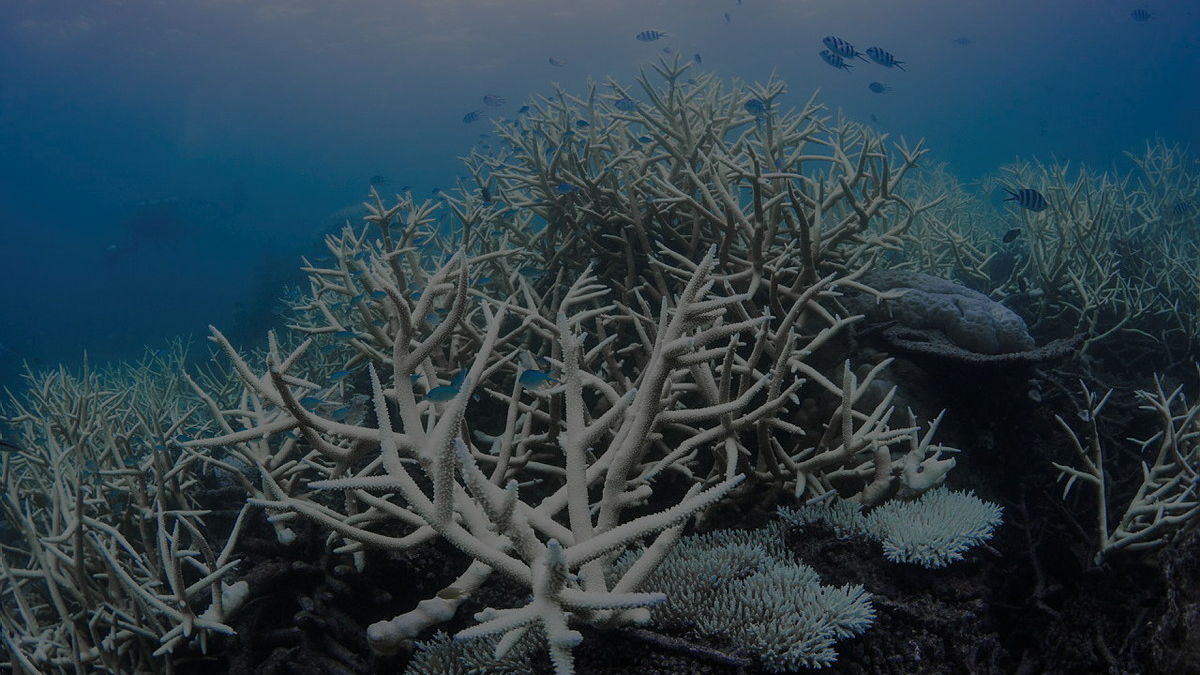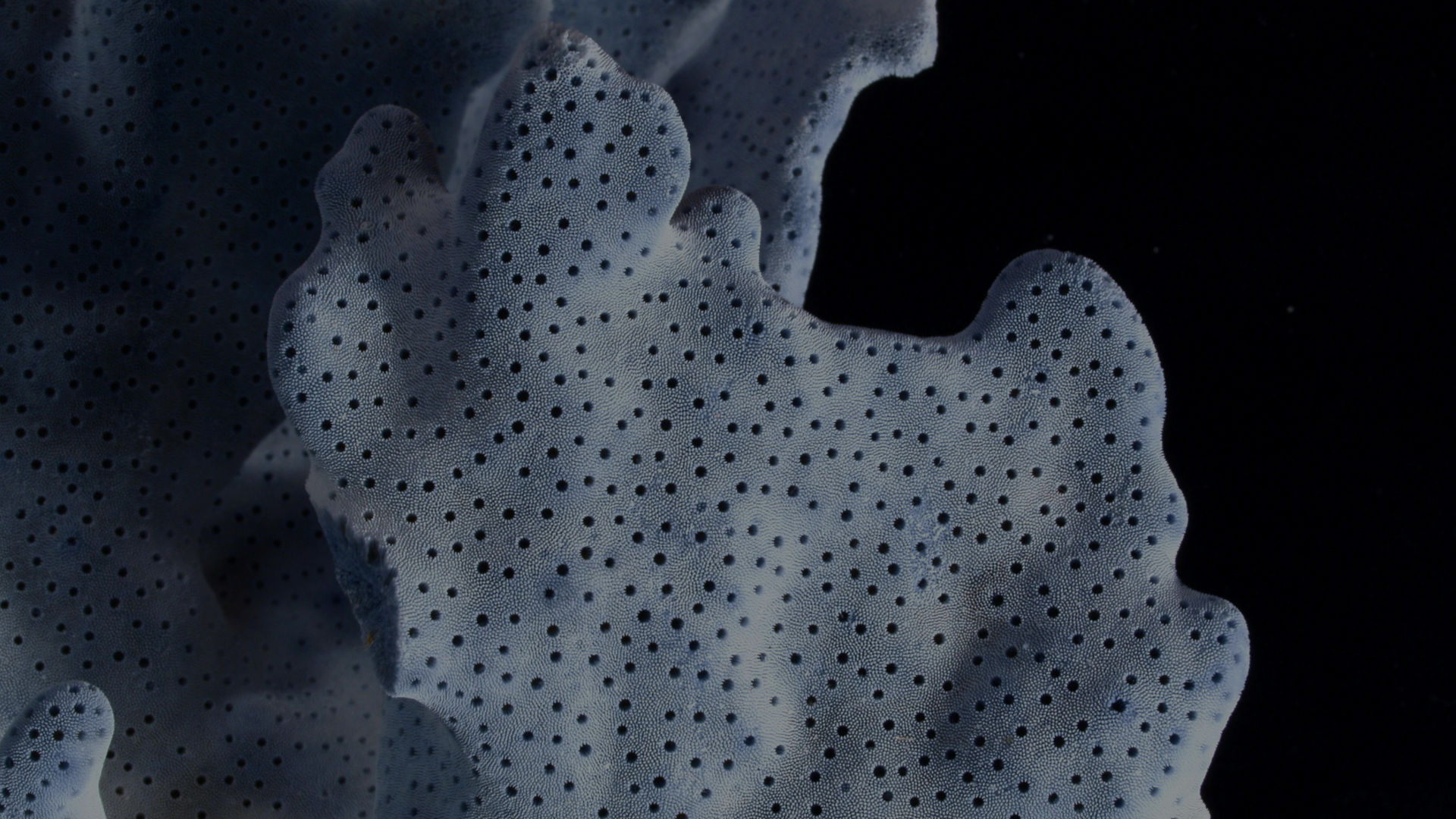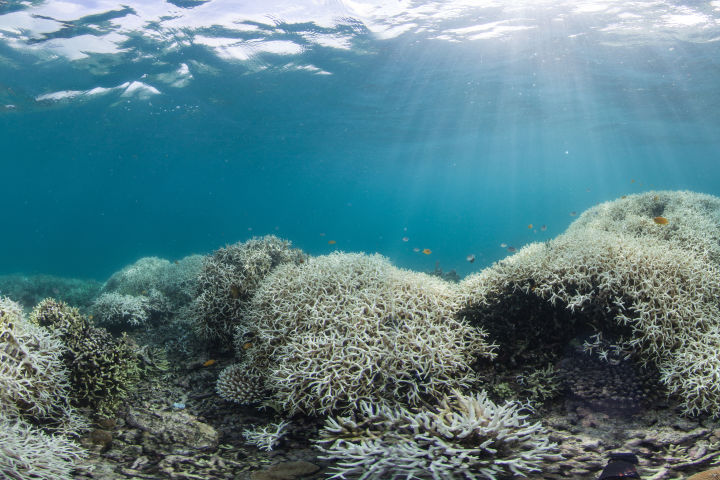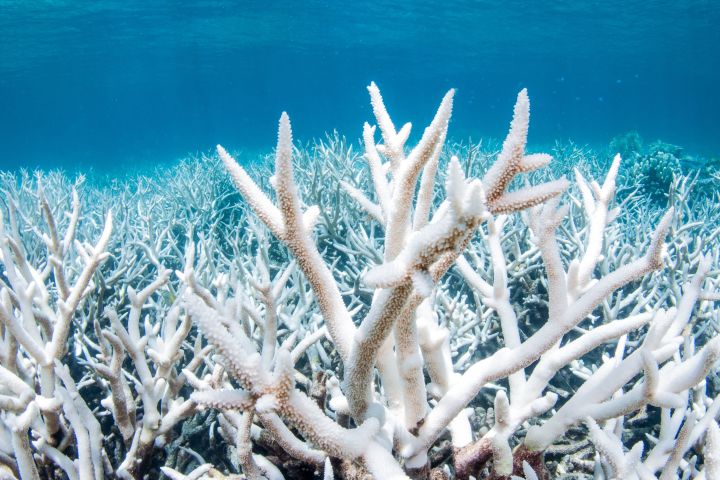
Coral Bleaching
Learn about coral bleaching, its causes, effects on the Great Barrier Reef, and how you can help combat this environmental threat.
#What is coral bleaching?
When corals are under stress, they expel the microscopic algae that live in their tissues. Without these algae, corals' tissues become transparent, exposing their white skeleton. This is called coral bleaching. Bleached corals are not dead, but are more at risk of starvation and disease.
#What causes coral bleaching?
Coral bleaching is usually triggered by heat stress caused by increased water temperatures and UV radiation, but can occur due to other factors such as changes in water quality.
#Facts about coral bleaching
Rising ocean temperatures caused by climate change is the primary cause of coral bleaching.
A temperature increase of just one degree Celsius for only four weeks can trigger bleaching.
During bleaching corals become transparent, revealing their white skeletons.
Changes in water quality, increased sun exposure and extreme low tides can also cause corals to bleach.

#You Can Help
There’s never been a more dangerous time for our reef systems, but the good news is we’ve never been in a better position to respond to the threat. The time for action is now. Together, we can make a difference and protect our planet's most precious ecosystems for future generations.
#Mass coral bleaching events
The past two decades have seen several widespread coral bleaching events on our Great Barrier Reef, with five mass bleaching events in the last eight years.
2025
In 2025, the Great Barrier Reef experienced its sixth mass bleaching since 2016 - only the second time it has suffered consecutive years of bleaching (2016–17 and 2024–25). Although less severe than in 2024, the event was the first time both of Australia’s World Heritage-listed reefs, the Great Barrier Reef and Ningaloo, have bleached simultaneously.
2024
In March 2024, the fifth mass bleaching event on the Great Barrier Reef was confirmed. It is part of the 4th global bleaching event, which began in 2023 in the northern hemisphere. The event has occurred during an El Niño year and followed the hottest year on record.
2022
Coral bleaching was observed along the length of the Reef, with the Northern and Central regions experiencing extreme bleaching. In the South, bleaching was mostly minor. This mass bleaching event was particularly concerning because it occurred during a La Niña summer, which typically brings cooler, wetter conditions.
2020
Widespread severe bleaching was detected across many regions of the Great Barrier Reef. Of the 1,036 reefs surveyed from the air, 60% suffered moderate or severe bleaching. On-water monitoring capabilities were restricted due to the Covid-19 pandemic, so limited data on coral mortality was collected.
2017
The Reef experienced unprecedented back-to-back (2016 and 2017) bleaching, collectively affecting two-thirds of the Great Barrier Reef. The central third of the Great Barrier Reef was severely affected in early 2017, due to unusually warm sea surface temperature and accumulated heat stress. The southern sector was spared both years.
2016
In 2016, the Far Northern management area between Cape York and Port Douglas experienced widespread and severe bleaching due to record ocean temperatures. This led to record widespread coral bleaching on the Reef, with overall coral mortality at 22%. Bleaching in southern parts of the Reef was less severe.
2006
A bleaching event largely confined to the southern part of the Reef, particularly around the Keppel Islands, took place in January and February 2006. The degree of bleaching was worse than in previous years, with up to 98% of corals bleached on some reefs.
2002
Across the 641 reefs observed, 54% bleached in the summer of 2001-2002. This mass bleaching event was slightly more severe than the 1997-1998 event, however reef recovery was general good with fewer than 5% of reefs suffering high mortality.
1998
The summer of 1997-1998 was one of the hottest recorded on the Reef in the 20th century. Mild bleaching was observed in late January and intensified in February and March. Most reefs recovered fully with less than 5% of inshore reefs suffering high coral mortality, however the most severely affected reefs in the Palm Island area saw up to 70% of corals die.
#Coral bleaching FAQs
What is coral?
A relative of jellyfish and sea anemones, corals are invertebrates that belong to a large group of animals called Cnidaria. They are known as colonial organisms, which means many individuals live and grow while connected to one another.
Each individual coral is made of a polyp – a clear, tube-shaped structure attached to a reef at one end and open at the other. The open end has a mouth that is surrounded by a ring of tentacles.
Hard corals extract calcium from seawater to make limestone outer skeletons, which form coral reefs. Soft corals tend to be feathery in appearance such as sea fans and sea feathers.
What is zooxanthellae?
Corals get most of their bright colours from microscopic algae that grows inside the polyps’ tissues. This algae, called zooxanthellae (pronounced zo-UH-zan-thuh-lay), helps corals by removing waste and using it to produce food in a process known as photosynthesis.
What is coral bleaching?
Coral bleaching occurs when corals become stressed by changes in their environment most commonly elevated sea temperatures and increased UV radiation. In response, they expel the microscopic algae (zooxanthellae) that live within their tissues and provide them with most of their energy through photosynthesis. Without these algae, the coral’s tissue becomes transparent, revealing the bright white calcium carbonate skeleton underneath. While bleached corals are still alive, they are significantly weakened and more vulnerable to starvation, disease, and mortality if stressful conditions persist.
What causes coral bleaching?
Coral bleaching is caused by environmental stress, most commonly from elevated sea temperatures. On the Great Barrier Reef, unusually warm ocean conditions during summer are the leading cause of bleaching events. When water temperatures rise by as little as one degree Celsius above the seasonal average for a period of four weeks, corals become stressed and expel the microscopic algae called zooxanthellae that live inside their tissues.
Other factors such as poor water quality, pollution, and increased ultraviolet radiation can also contribute to the severity of bleaching and reduce the coral’s ability to recover.
Can corals recover from bleaching?
Yes, corals can recover from bleaching over time, but only if temperatures drop and conditions return to normal. When this happens, the algae returns and the corals gradually regain their health.
How to stop coral bleaching?
Coral bleaching can’t be stopped entirely, but we can reduce its impact by cutting emissions, limiting local stressors like pollution, and supporting reef restoration efforts. Protecting coral reefs also means reducing coastal runoff, establishing marine protected areas, and investing in research that helps corals adapt to rising temperatures.
Is coral bleaching a natural process?
Coral bleaching is a stress response and individual coral colonies suffer from a degree of bleaching in any given summer. This is a natural process and not of particular concern.
Large-scale marine heatwaves create mass coral bleaching events however, in which large numbers of corals bleach severely over a wide area. These events are typically associated with high levels of coral mortality.
As climate change causes ocean temperatures to rise, marine heatwaves and associated coral bleaching events are becoming more frequent and severe, and the Reef’s natural recovery processes are unable to keep up.
Are other reefs around the world being affected?
Yes. Severe, widespread coral bleaching is an issue on coral reefs around the world as a result of changes to the Earth’s climate.
Is the Great Barrier Reef dead?
No. The Great Barrier Reef is made up of 3,000 reefs and is home to thousands of species of marine life. Reports focusing on “how much of the Reef has died” imply finality. Reefs can be severely affected by bleaching but begin to recover as coral communities re-grow and new coral larvae settle on the reef.
Why do we need to intervene? Won't the Reef just adapt naturally?
The Great Barrier Reef is one of the richest and most complex natural ecosystems in the world. Climate change, which causes temperatures to rise on our land and in our oceans, is the biggest threat to the future of the Great Barrier Reef and coral reefs around the world.
We need urgent action on climate change to drastically reduce global emissions, but this alone is not enough. Action on climate change requires a dual effort to protect our reefs. While the world works towards reducing greenhouse gas emissions, we must make coral reefs more resilient and help them adapt to the warmer temperatures already caused by climate change.
Can I help corals recover from bleaching?
There’s never been a more dangerous time for our reef systems, but the good news is we’ve never been in a better position to respond to the threat.
The time for action is now. Together, we can make a difference and protect our planet's most precious ecosystems for future generations.

Coral Bleaching on the Great Barrier Reef. Credit: Underwater Earth / XL Catlin Seaview Survey / Christophe Bailhache

Bleaching Corals Expel Their Zooxanthellae, Revealing a Bright White Skeleton
Top image credit: Underwater Earth / XL Catlin Seaview Survey / Christophe Bailhache

#Tomorrow needs you, now.
The Great Barrier Reef is in desperate need of support. Donate today to help grow new baby corals, creating a better future for the Reef.
